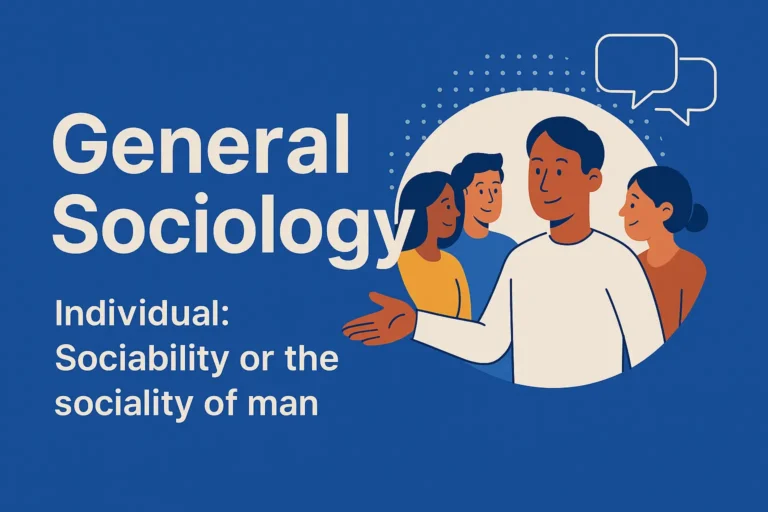Functions: Transfer of Knowledge, Define Situation, Provide Behaviour Pattern, Moulds Personality
(General Sociology – Culture: Functions – Transfer of Knowledge, Define Situation, Provide Behaviour Pattern, Moulds personality)
Culture is more than just traditions and rituals; it’s the blueprint of society, guiding people in how they think, feel, act, and relate to one another. It is through culture that human behaviour becomes patterned and predictable. Sociologists have identified several core functions that culture performs in every society. These include the transfer of knowledge, defining situations, providing behaviour patterns, and moulding personality.
Transfer of Knowledge
One of the most important functions of culture is to preserve and transmit knowledge across generations. Unlike animals, which act based on instincts, humans require past experiences for their behaviours. Humans, on the other hand, acquire heritage knowledge, practices, and skills through culture, which has been accumulated over centuries.
Culture provides a platform for learning through symbols, stories, language, education systems, and rituals. Knowledge retrieval and sharing, particularly through language, serve as a fundamental means of culture. The teachings of religion, science, history, medicine, and art are all cultural and knowledge products passed down through formal and informal methods.
Without this cultural inheritance, each generation would need to start from scratch. Through culture, humanity has built upon the progress of past civilisations and continues to innovate.
Define Situation
Culture also helps individuals make sense of the world around them. Every society has its own set of cues, norms, and symbols that help define specific social situations. For example, what’s considered polite in one culture might be seen as rude in another.
Culture defines when to speak, how to greet, what to wear, and how to act in different contexts, be it a funeral, wedding, classroom, or workplace. Customs signal what actions are appropriate or inappropriate, and guide action sequences while maintaining order.
In the absence of culture, there would be constant social scenario interpretation issues. Extending one’s hand may mean extending a gesture of friendship in some cultures, while in others, it translates to hostility. Thus, culture teaches individuals how to respond appropriately in every situation.
Provide Behaviour Pattern
Culture establishes a coherent framework within which each person functions. It sets sociological objectives for individuals and describes steps toward attaining acceptance in society. Culture provides comprehensive guidelines and anticipations ranging from daily habits like eating and dressing to major life decisions, such as getting married or pursuing a career.
Culture’s provision of prescriptive expectations helps minimise the trial-and-error approach. Acceptable actions assist conflict avoidance as well as socially unacceptable actions, while providing support to pro-social behaviours.
Thus, culture offers supportive structures while simultaneously acting as limits, paradoxically granting freedom and creativity alongside boundaries. Furthermore, it formulates systems of social control through the enforcement of values, laws, and morals, thereby maintaining equilibrium and order within social structures.
Moulds Personality
The most crucial role is culture’s intersection with the individual’s personality. Humanity has specific, defined traits shaped by a combination of particular influences and a specific cultural environment.
Core values shape the culture that surrounds a human being, in this case, a child who is being named, nurtured, schooled, and instructed, which goes through a set of defined steps. Culture, as a motivator, determines how thoughts, feelings, and behaviours develop, and also directs actions, emotions, and motivations.
Different cultures shape different types of personalities:
- Competitive cultures foster ambition and drive.
- Creative cultures nurture innovation and imagination.
- Religious cultures emphasize duty, devotion, and moral values.
- Hardworking cultures promote discipline and perseverance.
- Free cultures tend to raise independent, analytical, and confident individuals.
Even language and symbols influence personality formation. A culture influences an individual’s way of speaking, gesturing, and even their behaviours. The values of a society shape a culture’s mindset, becoming individual patterns and personalities over time.
Conclusion
Culture may appear to be a mere setting, but it influences people’s ways of learning, actions, interactions, and development. It incorporates the transmission of information as well as the development of character. Therefore, culture is the backbone of every society, providing it continuity, stability and coherence.
Exploring the functions of culture is crucial for scholarship achievement, but more importantly, for analysing social behaviour outside of academic settings, especially in a practical context. Culture helps explain human behaviour. It also helps in understanding the reasons behind the behaviours and actions of people in a complex society.






